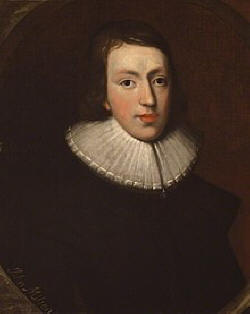

Queer Places:
St Giles Cripplegate Churchyard London, City of London, Greater London, England
Cenotaph Westminster Abbey Westminster, City of Westminster, Greater London, England, Plot Poet's Corner
 John
Milton (December 9, 1608 – November 8, 1674) may be the greatest poet in the English language. A political activist
and fierce controversialist, he is at once the voice of revolutionary idealism
and the icon of Christian humanism, as monumentalized in Paradise Lost (1667).
Although he has often been accused of misogyny, his attitude toward women was
advanced for his day. Similarly, though there is no doubt that he accepted the
biblical condemnation of sodomy, there is reason to think that his attitude
toward same-sex relations was enlightened for his age.
John
Milton (December 9, 1608 – November 8, 1674) may be the greatest poet in the English language. A political activist
and fierce controversialist, he is at once the voice of revolutionary idealism
and the icon of Christian humanism, as monumentalized in Paradise Lost (1667).
Although he has often been accused of misogyny, his attitude toward women was
advanced for his day. Similarly, though there is no doubt that he accepted the
biblical condemnation of sodomy, there is reason to think that his attitude
toward same-sex relations was enlightened for his age.
In a psychoanalytic study, John Shawcross analyzed Milton's intense relationship with his boyhood friend Charles Diodati, concluding that "The total view of Diodati seen from the extant evidence certainly points to a homosexual nature; of Milton, to a latent homosexualism which was probably repressed consciously (as well as subconsciously) from becoming overt except with Diodati."
There is no evidence that Milton was ever again so attached to another male after Diodati's early death in 1638. In 1642, the poet married the seventeen-year-old Mary Powell and subsequently remarried twice following the deaths of his wives.
Still, his attachment to Diodati may help explain his attitudes toward homosexuality in Paradise Regained (1670) and other works. The homosexual allusions of Elegy VII (1627), the epigraphs on the title pages of the Masque (1637) and Poems (1645), which are from Virgil's homoerotic second eclogue, and the highly charged homoeroticism and homosexual allusions of his elegy for Diodati, Epitaphium Damonis (1638), all suggest both Milton's deep familiarity with the classical literature of homosexuality and his capacity for discovering in it emotions correlative to his own.
In various prose works, Milton unremarkably lists sodomy among the numerous offenses against chastity and evokes Sodom as a precedent of God's anger with the ungodly. More interesting are the notes recorded in the Trinity manuscript for a proposed dramatization of the Sodom story. In "Cupids funeral pile. Sodom burning," Milton planned to depict the residents of the city "every one with mistresse, or Ganymed," and to feature an angelic debate about "love & how it differs from lust."
What is clear from these notes is that though Milton recognized homosexuals and heterosexuals as distinct classes, he did not conceive of the Sodom story as referring exclusively to homosexuality. God's destruction of Sodom signified to Milton the generalized issue of lust, as is also clear from the citation of "that bituminous Lake where Sodom flam'd" in Paradise Lost (10.562) in association with the bitter ashes tasted by the fallen angels after the fall of Adam and Eve.
In Paradise Lost (1.502-506), Milton juxtaposes the Sodom episode with the grisly tale recounted in Judges 19 of the Levite concubine who is gang-raped to death. He seems to have interpreted both biblical stories as warnings against rape and inhospitality.
Milton's most significant literary engagement with homosexuality occurs in Paradise Regained. There he tactfully incorporates a homosexual temptation into the famous banquet scene by means of significant allusions to Alexander the Great, Scipio Africanus, Ganymede, and Hylas.
After citing Alexander and Scipio as examples of individuals unsusceptible to heterosexual temptations, Satan tempts Christ with a seductive tableau vivant that includes "Tall stripling youths rich clad, of fairer hew / Then Ganymed or Hylas" (2.352-53). Milton's carefully modulated homoerotic temptation thus reaches its culmination in the alluring presence of beautiful youths who symbolize the power of homosexual love to attract figures as stalwart as Jove and Hercules and as restrained as Alexander and Scipio.
My published books: